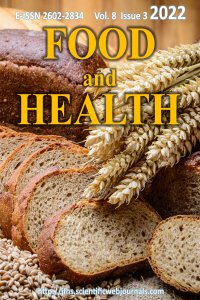Research Article
Year 2022,
Volume: 8 Issue: 3, 218 - 228, 01.07.2022
Abstract
Project Number
10010
References
- Aliyazicioglu, Y., Demir, S., Turan, I., Cakiroglu, T., Akalin, I., Deger, O., & Bedir, A. (2011). Preventive and protective effects of Turkish propolis on H 2 O 2 -induced DNA damage in foreskin fibroblast cell lines. Acta Biologica Hungarica, 62(4), 388-396. https://doi.org/10.1556/ABiol.62.2011.4.5
- Barlak, Y., Değer, O., Çolak, M., Karataylı, S., Bozdayı, A., Yücesan, F. (2011). Effect of Turkish propolis extracts on proteome of prostate cancer cell line. Proteome Science, 9(1), 74. https://doi.org/10.1186/1477-5956-9-74
- Barlak, Y., Değer, O., Uçar, M., Çakıroğlu, T. N. (2015). Effects of Turkish propolis extract on secretion of polymorphonuclear elastase following respiratory burst. Turkish Journal of Biology, 39, 194-201. https://doi.org/10.3906/biy-1402-48
- Bozkuş, T. N., Değer, O., Yaşar, A. (2021). Chemical characterization of water and ethanolic extracts of Turkish propolis by HPLC-DAD and GC-MS. Journal of Liquid Chromatography & Related Technologies, 44(1–2), 77-86. https://doi.org/10.1080/10826076.2021.1883648
- Búfalo, M.C., Candeias, J.M.G., Sousa, J.P.B., Bastos, J.K., Sforcin, J.M. (2010). In vitro cytotoxic activity of Baccharis dracunculifolia and propolis against HEp-2 cells. Natural Product Research, 24(18), 1710-1718. https://doi.org/10.1080/14786410902909300
- Búfalo, Michelle C., Candeias, J.M.G., Sforcin, J.M. (2009). In Vitro Cytotoxic Effect of Brazilian Green Propolis on Human Laryngeal Epidermoid Carcinoma (HEp-2) Cells. Evidence-Based Complementary and Alternative Medicine, 6(4), 483-487. https://doi.org/10.1093/ecam/nem147
- da Silva Frozza, C.O., Garcia, C.S.C., Gambato, G., de Souza, M.D.O., Salvador, M., Moura, S., Padilha, F.F., Seixas, F.K., Collares, T., Borsuk, S., Dellagostin, O.A., Henriques, J.A.P., Roesch-Ely, M. (2013). Chemical characterization, antioxidant and cytotoxic activities of Brazilian red propolis. Food and Chemical Toxicology, 52, 137-142. https://doi.org/10.1016/j.fct.2012.11.013
- Díaz-Carballo, D., Malak, S., Bardenheuer, W., Freistuehler, M., Peter Reusch, H. (2008). The contribution of plukenetione A to the anti-tumoral activity of Cuban propolis. Bioorganic & Medicinal Chemistry, 16(22), 9635-9643. https://doi.org/10.1016/j.bmc.2008.10.019
- Lee, Y.-T., Don, M.-J., Hung, P.-S., Shen, Y.-C., Lo, Y.-S., Chang, K.-W., Chen, C.-F., Ho, L.-K. (2005). Cytotoxicity of phenolic acid phenethyl esters on oral cancer cells. Cancer Letters, 223(1), 19-25. https://doi.org/10.1016/j.canlet.2004.09.048
- Mishima, S., Inoh, Y., Narita, Y., Ohta, S., Sakamoto, T., Araki, Y., Suzuki, K.-M., Akao, Y., Nozawa, Y. (2005a). Identification of caffeoylquinic acid derivatives from Brazilian propolis as constituents involved in induction of granulocytic differentiation of HL-60 cells. Bioorganic & Medicinal Chemistry, 13(20), 5814-5818. https://doi.org/10.1016/j.bmc.2005.05.044
- Mishima, S., Narita, Y., Chikamatsu, S., Inoh, Y., Ohta, S., Yoshida, C., Araki, Y., Akao, Y., Suzuki, K.-M., Nozawa, Y. (2005b). Effects of propolis on cell growth and gene expression in HL-60 cells. Journal of Ethnopharmacology, 99(1), 5-11. https://doi.org/10.1016/j.jep.2005.02.005
- Nagai, T., Inoue, R., Inoue, H., Suzuki, N. (2003). Preparation and antioxidant properties of water extract of propolis. Food Chemistry, 80(1), 29-33. https://doi.org/10.1016/S0308-8146(02)00231-5
- Nakajima, Y., Tsuruma, K., Shimazawa, M., Mishima, S., Hara, H. (2009). Comparison of bee products based on assays of antioxidant capacities. BMC Complementary and Alternative Medicine, 9(1), 4. https://doi.org/10.1186/1472-6882-9-4
- Oršolić, N., Knežević, A.H., Šver, L., Terzić, S., Bašić, I. (2004). Immunomodulatory and antimetastatic action of propolis and related polyphenolic compounds. Journal of Ethnopharmacology, 94(2-3), 307-315. https://doi.org/10.1016/j.jep.2004.06.006
- Oršolic, N., Šver, L., Terzić, S., Bašić, I. (2005). Peroral Application of Water-soluble Derivative of Propolis (WSDP) and Its Related Polyphenolic Compounds and Their Influence on Immunological and Antitumour Activity. Veterinary Research Communications, 29(7), 575-593. https://doi.org/10.1007/s11259-005-3303-z
- Russo, A., Cardile, V., Sanchez, F., Troncoso, N., Vanella, A., Garbarino, J.A. (2004). Chilean propolis: antioxidant activity and antiproliferative action in human tumor cell lines. Life Sciences, 76(5), 545–558. https://doi.org/10.1016/j.lfs.2004.07.019
- Sforcin, J.M. (2007). Propolis and the immune system: a review. Journal of Ethnopharmacology, 113(1), 1-14. https://doi.org/10.1016/j.jep.2007.05.012
- Sforcin, José Maurício, Bankova, V. (2011). Propolis: Is there a potential for the development of new drugs? Journal of Ethnopharmacology, 133(2), 253-260. https://doi.org/10.1016/j.jep.2010.10.032
- Suzuki, I., Hayashi, I., Takaki, T., Groveman, D. S., Fujimiya, Y. (2002). Antitumor and Anticytopenic Effects of Aqueous Extracts of Propolis in Combination with Chemotherapeutic Agents. Cancer Biotherapy and Radiopharmaceuticals, 17(5), 553-562. https://doi.org/10.1089/108497802760804781
- Uçar, M., Değer, O., Barlak, Y. (2016). Effect of Turkish propolis extracts on expression of voltage-gated sodium channel Nav 1.5 and 1.7 α-Isoforms in PC-3 human prostate cancer cells. Tropical Journal of Pharmaceutical Research, 15(10), 2093. https://doi.org/10.4314/tjpr.v15i10.6
Cytotoxic effects of water and ethanolic extracts of Turkish propolis on human laryngeal epidermoid carcinoma cell lines
Abstract
Propolis is a natural resinous substance collected by bees from various types of trees and plants and has antibacterial, antiviral and antitumoral features depending on its antioxidant properties. Major aim is to investigate cytotoxic effect of Turkish propolis on human laryngeal epidermoid carcinoma (HEp-2) cells. HEp-2 cells/well were loaded on RTCA(real time cell analysis) system and the cell index was followed up during 48 hours. Water extract of Turkish propolis (WEP) of 250-10.000 μg/mL concentrations and ethanolic extracts of Turkish propolis (EEP) of 10-2.400 μg/mL concentrations were treated with HEp-2 cells and followed by RTCA system. The cell indexes and IC50 values were determined. HEp-2 cells were incubated with WEP and EEP. Proliferation was followed by flow cytometric DNA cycle analysis. WEP and EEP were found to be cytotoxic to HEp-2 cells. When WEP and EEP were incubated with HEp-2 cells during 72 hours, the highest antiproliferative effect was seen by interfering DNA cycles. Turkish propolis extracts were found to be cytotoxic and antiproliferative to HEp- 2 cells in the present study, therefore, it was concluded that it may fall within chemotherapy or target therapies for larynx cancers.
Supporting Institution
The study was supported by Karadeniz Technical University Research Funding
Project Number
10010
References
- Aliyazicioglu, Y., Demir, S., Turan, I., Cakiroglu, T., Akalin, I., Deger, O., & Bedir, A. (2011). Preventive and protective effects of Turkish propolis on H 2 O 2 -induced DNA damage in foreskin fibroblast cell lines. Acta Biologica Hungarica, 62(4), 388-396. https://doi.org/10.1556/ABiol.62.2011.4.5
- Barlak, Y., Değer, O., Çolak, M., Karataylı, S., Bozdayı, A., Yücesan, F. (2011). Effect of Turkish propolis extracts on proteome of prostate cancer cell line. Proteome Science, 9(1), 74. https://doi.org/10.1186/1477-5956-9-74
- Barlak, Y., Değer, O., Uçar, M., Çakıroğlu, T. N. (2015). Effects of Turkish propolis extract on secretion of polymorphonuclear elastase following respiratory burst. Turkish Journal of Biology, 39, 194-201. https://doi.org/10.3906/biy-1402-48
- Bozkuş, T. N., Değer, O., Yaşar, A. (2021). Chemical characterization of water and ethanolic extracts of Turkish propolis by HPLC-DAD and GC-MS. Journal of Liquid Chromatography & Related Technologies, 44(1–2), 77-86. https://doi.org/10.1080/10826076.2021.1883648
- Búfalo, M.C., Candeias, J.M.G., Sousa, J.P.B., Bastos, J.K., Sforcin, J.M. (2010). In vitro cytotoxic activity of Baccharis dracunculifolia and propolis against HEp-2 cells. Natural Product Research, 24(18), 1710-1718. https://doi.org/10.1080/14786410902909300
- Búfalo, Michelle C., Candeias, J.M.G., Sforcin, J.M. (2009). In Vitro Cytotoxic Effect of Brazilian Green Propolis on Human Laryngeal Epidermoid Carcinoma (HEp-2) Cells. Evidence-Based Complementary and Alternative Medicine, 6(4), 483-487. https://doi.org/10.1093/ecam/nem147
- da Silva Frozza, C.O., Garcia, C.S.C., Gambato, G., de Souza, M.D.O., Salvador, M., Moura, S., Padilha, F.F., Seixas, F.K., Collares, T., Borsuk, S., Dellagostin, O.A., Henriques, J.A.P., Roesch-Ely, M. (2013). Chemical characterization, antioxidant and cytotoxic activities of Brazilian red propolis. Food and Chemical Toxicology, 52, 137-142. https://doi.org/10.1016/j.fct.2012.11.013
- Díaz-Carballo, D., Malak, S., Bardenheuer, W., Freistuehler, M., Peter Reusch, H. (2008). The contribution of plukenetione A to the anti-tumoral activity of Cuban propolis. Bioorganic & Medicinal Chemistry, 16(22), 9635-9643. https://doi.org/10.1016/j.bmc.2008.10.019
- Lee, Y.-T., Don, M.-J., Hung, P.-S., Shen, Y.-C., Lo, Y.-S., Chang, K.-W., Chen, C.-F., Ho, L.-K. (2005). Cytotoxicity of phenolic acid phenethyl esters on oral cancer cells. Cancer Letters, 223(1), 19-25. https://doi.org/10.1016/j.canlet.2004.09.048
- Mishima, S., Inoh, Y., Narita, Y., Ohta, S., Sakamoto, T., Araki, Y., Suzuki, K.-M., Akao, Y., Nozawa, Y. (2005a). Identification of caffeoylquinic acid derivatives from Brazilian propolis as constituents involved in induction of granulocytic differentiation of HL-60 cells. Bioorganic & Medicinal Chemistry, 13(20), 5814-5818. https://doi.org/10.1016/j.bmc.2005.05.044
- Mishima, S., Narita, Y., Chikamatsu, S., Inoh, Y., Ohta, S., Yoshida, C., Araki, Y., Akao, Y., Suzuki, K.-M., Nozawa, Y. (2005b). Effects of propolis on cell growth and gene expression in HL-60 cells. Journal of Ethnopharmacology, 99(1), 5-11. https://doi.org/10.1016/j.jep.2005.02.005
- Nagai, T., Inoue, R., Inoue, H., Suzuki, N. (2003). Preparation and antioxidant properties of water extract of propolis. Food Chemistry, 80(1), 29-33. https://doi.org/10.1016/S0308-8146(02)00231-5
- Nakajima, Y., Tsuruma, K., Shimazawa, M., Mishima, S., Hara, H. (2009). Comparison of bee products based on assays of antioxidant capacities. BMC Complementary and Alternative Medicine, 9(1), 4. https://doi.org/10.1186/1472-6882-9-4
- Oršolić, N., Knežević, A.H., Šver, L., Terzić, S., Bašić, I. (2004). Immunomodulatory and antimetastatic action of propolis and related polyphenolic compounds. Journal of Ethnopharmacology, 94(2-3), 307-315. https://doi.org/10.1016/j.jep.2004.06.006
- Oršolic, N., Šver, L., Terzić, S., Bašić, I. (2005). Peroral Application of Water-soluble Derivative of Propolis (WSDP) and Its Related Polyphenolic Compounds and Their Influence on Immunological and Antitumour Activity. Veterinary Research Communications, 29(7), 575-593. https://doi.org/10.1007/s11259-005-3303-z
- Russo, A., Cardile, V., Sanchez, F., Troncoso, N., Vanella, A., Garbarino, J.A. (2004). Chilean propolis: antioxidant activity and antiproliferative action in human tumor cell lines. Life Sciences, 76(5), 545–558. https://doi.org/10.1016/j.lfs.2004.07.019
- Sforcin, J.M. (2007). Propolis and the immune system: a review. Journal of Ethnopharmacology, 113(1), 1-14. https://doi.org/10.1016/j.jep.2007.05.012
- Sforcin, José Maurício, Bankova, V. (2011). Propolis: Is there a potential for the development of new drugs? Journal of Ethnopharmacology, 133(2), 253-260. https://doi.org/10.1016/j.jep.2010.10.032
- Suzuki, I., Hayashi, I., Takaki, T., Groveman, D. S., Fujimiya, Y. (2002). Antitumor and Anticytopenic Effects of Aqueous Extracts of Propolis in Combination with Chemotherapeutic Agents. Cancer Biotherapy and Radiopharmaceuticals, 17(5), 553-562. https://doi.org/10.1089/108497802760804781
- Uçar, M., Değer, O., Barlak, Y. (2016). Effect of Turkish propolis extracts on expression of voltage-gated sodium channel Nav 1.5 and 1.7 α-Isoforms in PC-3 human prostate cancer cells. Tropical Journal of Pharmaceutical Research, 15(10), 2093. https://doi.org/10.4314/tjpr.v15i10.6
There are 20 citations in total.
Details
| Primary Language | English |
|---|---|
| Subjects | Clinical Sciences |
| Journal Section | Research Article |
| Authors | |
| Project Number | 10010 |
| Publication Date | July 1, 2022 |
| Submission Date | December 12, 2021 |
| Published in Issue | Year 2022 Volume: 8 Issue: 3 |
Journal is licensed under a
CreativeCommons Attribtion-ShareAlike 4.0 International Licence 


Diamond Open Access refers to a scholarly publication model in which journals and platforms do not charge fees to either authors or readers.
Open Access Statement:
This is an open access journal which means that all content is freely available without charge to the user or his/her institution. Users are allowed to read, download, copy, distribute, print, search, or link to the full texts of the articles, or use them for any other lawful purpose, without asking prior permission from the publisher or the author. This is in accordance with the BOAI definition of open access.
Archiving Policy:
Archiving is done according to ULAKBİM "DergiPark" publication policy (LOCKSS).

